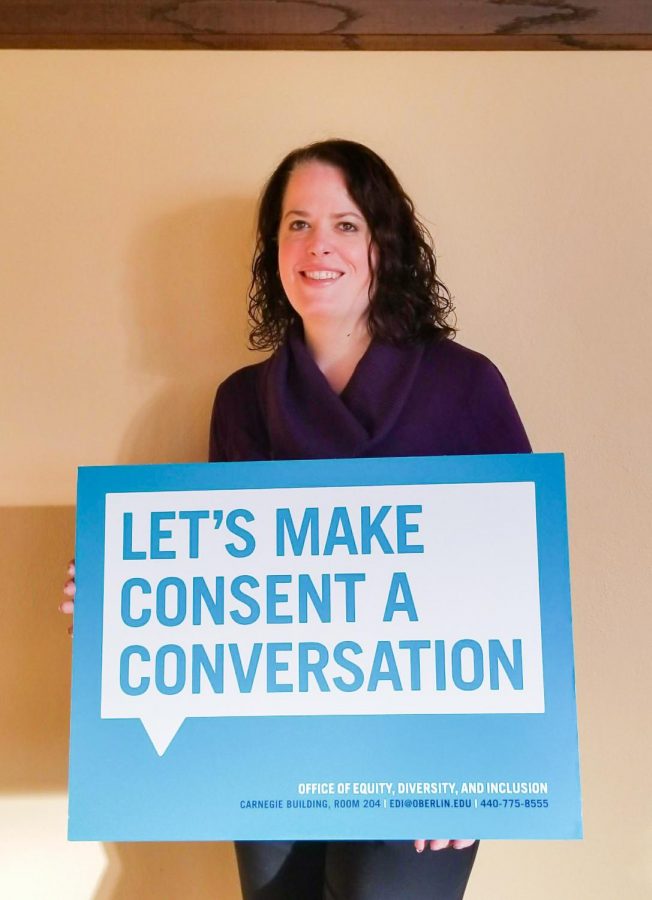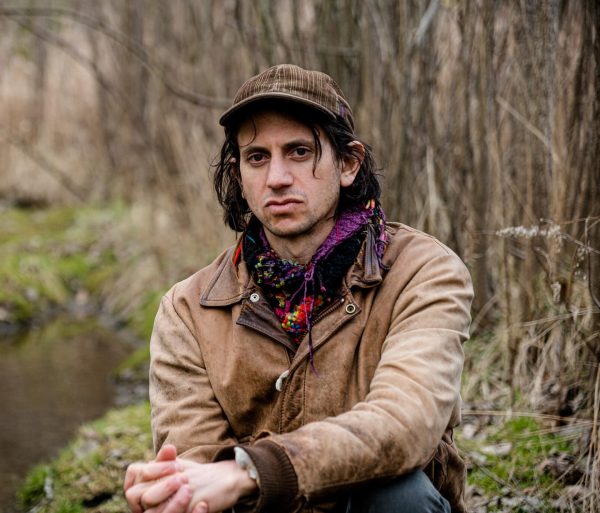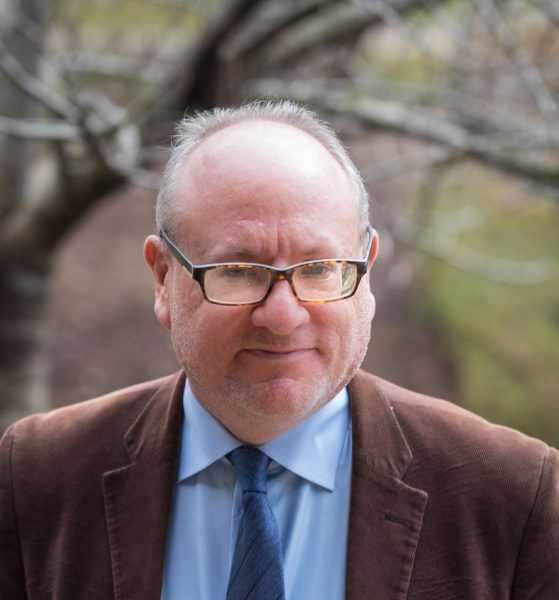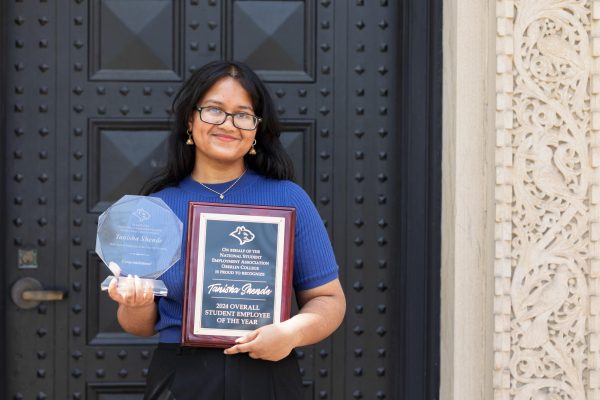OTC: Rebecca Mosely, Title IX Coordinator
Photo by Christian Bolles, Editor-in-Chief
Title IX Coordinator Rebecca Mosely
Rebecca Mosely serves as the Title IX coordinator and director of Equity, Diversity, and Inclusion at Oberlin College. She develops and administers policy on discrimination and harassment and handles issues concerning equity policy and concerns. Before taking on this role a year and a half ago, Mosely served in the Office of Residential Education for 11 years. She earned her bachelor’s degree in French education and a master’s degree in student affairs and higher education from The Ohio State University. Mosely is currently working toward her Ph.D. in higher education at Bowling Green State University.
What has the Title IX Office been working on this semester?
We’ve been doing our normal work of supporting students, faculty, and staff who have experienced violations or potential violations of our policy, which is always an ongoing thing, but we’ve also been doing a lot of work this fall to train all of our first-year students in our PRSM Essentials. The PRSM student organization works with our office, and they did a fantastic job this fall getting all of that training done. They also just put on the first-ever Consent for Men workshop last weekend, which we’re really proud and excited about. The last thing we’ve been spending a lot of time on this fall is our awareness campaign, which we kicked off this year, which is our Let’s Make Consent a Conversation campaign. Students all should’ve received a flyer in the mail over the summer that started it off. We’ve done two posters and videos, as well as a fair number of posters about what different organizations on campus do around preventing sexual violence or helping with sexual help.
How did the Consent for Men workshop go?
They had it this past weekend, and they had 50 men show up, which was really exciting. It was way more than they were expecting, and the feedback that we got was super positive. I was actually just talking with one of our trainers about it, and he said that the guys who attended were very appreciative to have the opportunity to come together and talk about it, because it’s something that they feel like they don’t talk about much outside of workshops. I know they’re actually looking at doing more of them and maybe [some] more specific to different identity groups as well.
How successful has the Let’s Make Consent a Conversation campaign been? What has it entailed?
We are really excited. This summer, we applied for a grant through the state of Ohio and got a [$10,000] grant to do an awareness campaign this year, and we’re lucky to have enough students here this summer that we were able to do a focus group and really think about what that campaign should entail. We’ve done a lot of swag for it, we’ve got stickers out there, we’ve got buttons out there, we’ve got the videos I said before. The work on that is helping students to think about discussing consent beyond just those workshops they do in their first year and recognizing that it’s an ongoing understanding that we develop as we continue to be in relationships with one another. Continuing the conversation helps us to do better at gaining consent in all aspects of our lives.
What is your office planning for next semester?
We actually sent four athletes this fall to a training that the state of Ohio did for a national training called the One Love Training, which is about domestic violence. All of the athletes are going to attend One Love Training next semester, and I actually met with the athletes that are the trainers last night, and we want to open it up to students beyond athletics on campus. We heard from students in our Essentials training this fall that they wish that they had more content on domestic violence, and we’re limited with how much we can fit in a two-hour session. We’ll be opening that up with some optional trainings for students to attend. Our trainers are also working right now to do a really cool training I’m excited about, about safe partying — how to host a safe party and what you might want to think about if you’re a student whose house it might be in. I think it’s really interesting to think about how we might prevent sexual violence in how we host our gatherings. They’re working on a healthy relationships workshop. How do you develop healthy relationships? They will be doing the support skills workshop that they developed last spring. You’ll see a lot more optional workshops coming out through PRSM this spring, and then all of our first-years will have the opportunity to go through bystander intervention training, which is something we started last year as a result of some of the information we got through our surveys.
How can students who are interested in these workshops get involved?
They can [visit] our PRSM Facebook page, because the events are always posted there. We hire PRSM trainers twice a year, typically, so we’ll be doing, I think, a pretty significant hiring this spring for the new trainers for fall. They can watch for those to come out late February/early March. We also partner a lot with OBI. We partner a lot with SIC. Both of those organizations do similar work and have really good opportunities for students to get invested and involved. The other group I think is interesting is [Voices Against Human Trafficking]. There’s lots of ways for students to get involved in the work that’s around sexual violence that doesn’t necessarily have to come out of my office, but can still spread really good information and support on campus.
What are your thoughts on the national conversation surrounding sexual assault?
I think Oberlin has been looked to by a lot of other institutions as a place to model how policies look. I think there was a fair amount of fear — and I’m not going to say it’s gone away — over what’s happened nationally with Betsy DeVos and some of the changes she’s made. As of now, it’s not impacting our policy and how we implement it. What, I think, has been interesting for me as a Title IX coordinator is seeing nationally the amount of reports that are going public has actually increased to some extent reports from people who have been gone from the institution for decades now. Looking back and trying to figure out how to support people who have lived with some kind of harm that happened here — sometimes before I was even born — has been a change in my practice.
What are some areas that Oberlin could improve?
I think the biggest thing that we need to continue to improve on here at Oberlin is truly the prevention work to stop people from getting into my office. I would love for us to not have to do this — that people weren’t getting harmed in the first place. I think that’s the reality of any good Title IX coordinator. We want to do everything we can to stop behavior before it happens so that we’re not having to support somebody going through something hard. I think Oberlin does really well at this already. I think to keep that conversation present and to keep people practicing good consent practices and caring for one another is [what] I want to see continue to grow and improve here.










